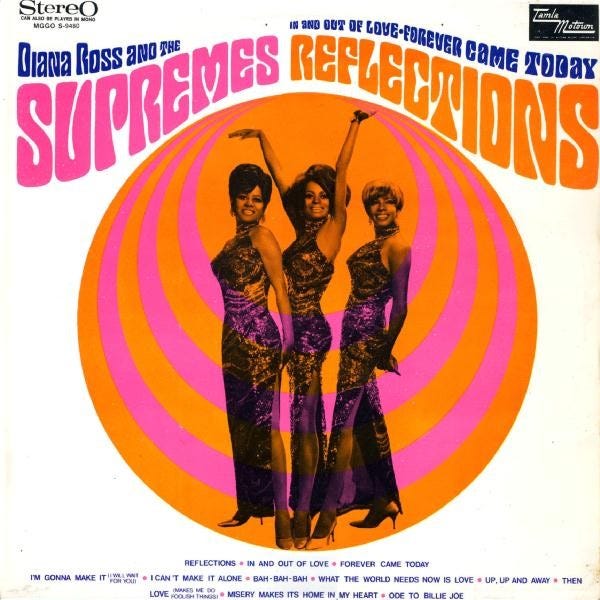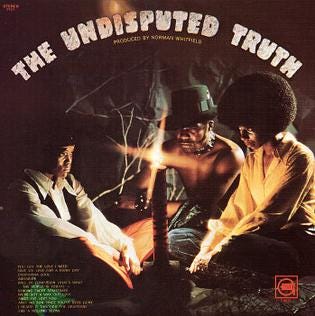"Reflections" by DIANA ROSS & THE SUPREMES
Released during 1967's Summer of Love, "Reflections" is when the biggest "Girl Group" in the world, The Supremes, became Diana Ross & The Supremes.
I see a dream that's lost
Flo Ballard had the biggest voice in The Supremes. This was true literally and figuratively: She had a regal, passionate presence that could reach the back pew of a church, and had been the group’s leader since they started playing small shows around Detroit as The Primettes. Mary Wilson, meanwhile, had the complimentary skills to be jazzy or bluesy or whatever the music called for, and the then Diane Ross had yet to turn her thin, reedy voice into an ideal pop commodity. The Primettes were intended as a distaff version of The Primes, the male vocal group that would go on to be The Temptations. Smokey Robinson had pitched the Primettes to Motown’s Berry Gordy in exchange for him poaching their guitar player for his band The Miracles. Gordy felt they were too young but ultimately relented, agreeing to let Robinson record the trio on the provision that they take a new name. He wrote down a list of suggested names — including The Darleens, The Sweet Ps, and The Jewlettes — and gave them an hour to decide. Ballard came back to him and said, “The Supremes.”
The Supremes had their first hit with “Where Did Our Love Go” in 1964, with Ross, her name changed to the more glamorous Diana, taking the lead vocal1. The song was written and produced by the team of Lamont Dozier and Brian and Eddie Holland, forever known as Holland-Dozier-Holland. The Motown system allowed producers to keep working with a group as long as the hits kept coming, and as Eddie Holland said, “We didn’t write songs; we wrote hits.” In a March 1967 session with The Supremes, they cut three new songs, including “The Happening,” a tie-in to a Hollywood movie by that name2, which would top the pop charts. It would be the last #1 that HDH made at Hitsville U.S.A.; they would leave Motown at the end of the year. “The Happening” would also be the last single by The Supremes. “Reflections,” recorded that same day, would be released on July 24 under the name Diana Ross and The Supremes. Flo Ballard was on the record, but by the summer of ‘67, she was out of the group.
“Reflections” went to #2 on the US pop charts in the hazy end of the Summer of Love, blocked from the top spot by Bobbie Gentry’s “Ode to Billie Joe.” The song would also give name to the 1968 album Reflections, the group’s 11th album in four years. That would be an impressive output even for a group that wasn’t being worked relentlessly, shuttled around the country for live engagements and TV appearances. Ballard, Ross, and Wilson were only ever home in Detroit to record, both new songs with Holland-Dozier-Holland3 and tribute albums like The Supremes Sing Rodgers & Hart and a scrapped Disney tribute conceived as Walt Disney was dying of lung cancer. On stage, they remained poised and elegant, but all three members of the group had spent time in hospitals for physical and mental breakdowns. Ross, who was by 1967 Gordy’s official girlfriend, was down to 90 pounds with bony shoulders poking out of her chic dresses. Ballard had been worn down in her own way by those years, chafing at Gordy’s favoritism toward Ross as her drinking went from bad to worse.
Motown songs, even those about shattering heartbreak, always had an undercurrent of optimistic energy befitting the label’s slogan, The Sound of Young America. “Reflections,” however, reflects a changing America, one with young people in the streets protesting racial inequality and the war in Viet Nam. The tense song is inflection point for Motown as well. Holland-Dozier-Holland added touches of psychedelic pop to pensive Fender Rhodes piano and bassist James Jamerson’s usual juggernaut groove. Motown wouldn’t sound the same after4. The electronic blips and whooshes that introduce the song were thought to be first appearance of a Moog synthesizer on a mainstream pop record5 but were actually produced the old fashioned way, through studio ingenuity — a test oscillator, used for tuning studio equipment and instruments, was treated with tape echo.
Reflections of
The way life used to be
Reflections of
The love you took from me
Oh, I'm all alone now
No love to shield me
Trapped in a world
That's a distorted reality
The Star Trek sound effects may have been a nod to the psychedelic ‘60s, but those jarring touches also reinforce the song’s lyrics, which vault past the usual three minutes of pop song heartbreak and into the distorted reality of depression. Ross sings with a restrained anguish, plagued by a sizzling tambourine6 that sounds like locusts. There are sudden overwhelming swells of strings and a chorus of flutes. The tension is increased by the song’s two bridges7, the first of which ascends uncomfortably and the second’s call and response is the only space for Ballard and Wilson to shine. Ross sounds wrongfooted in both, contrasting with her typical composed charm. Whoever Ross is singing as, you can’t help but feel for her.
Then again, Ross would have had a lot to draw on in March sessions. She, Ballard, and Wilson had been run ragged since they shook off their Motown nickname of “No Hit Supremes.” All had suffered physical and mental breakdowns. Growing tensions within the group were obvious to everyone at Motown. Ross had become brittle and snappish; Ballard was resentful and no longer disguising her heavy drinking; and Wilson was fraying as the peacemaker caught in between.
After Ballard was in no condition to perform a concert in New Orleans, Gordy instructed that she be put on the next plane to Detroit and resolved to find her replacement. He decided on Cindy Birdsong of the group The Bluebells, whose look was similar to Ballard’s. Accounts differ on Gordy’s firing of Ballard, but none of them reflect well on his management style. He called a group meeting at one of houses on a Sunday afternoon in April. While the change was already decided and a replacement chosen, Gordy had no fixed script or plan, improvising his way through the meeting. He offered scenarios ranging from a Ballard solo contract to naming Birdsong, who waited by the entrance, as a Broadway-like understudy. Ballard was uncharacteristically silent, which left left it to Mary Wilson to say the obvious: Her friend, whose suffering was breaking her heart, really wanted out of the group. And for that, Ballard never forgave her.
Diana Ross & The Supremes would continue on until 1969, ending on Cream Of The Crop, the 18th studio album by The Supremes8. The record’s “Someday We Will Be Together,” intended as a Ross solo song and recorded without Wilson and Birdsong, topped the charts as the last #1 single of the 1960s. Florence Ballard died in Detroit in 1976 of a heart attack resulting from coronary thrombosis. She was 32.
11 Song Playlist
Songs from the Diana Ross & The Supremes era.
Thank You
The idea behind The Best Song Ever (This Week) is yes, hearing a song and thinking it’s the best thing… until you hear another song that makes you feel the same way later on. But it’s also me trying to figure out what it is about a song that makes it feel that way. Thanks for giving me the opportunity to figure out why “Reflections” has long been my favorite song by The Supremes by writing about its story.
Gil Askey, musical director of the Supremes said, “Diana Ross had the ideal commercial voice. When she had to, she could go get the butter.”
Billed as “The Swinging Hit Picture,” the film, starring Anthony Quinn, proved to be neither. Here’s the IMDB description: “Young drifters kidnap rich businessman Roc Delmonico for kicks and demand $200K for his release. But none of Roc's relatives or Mafia associates want to part with the money. So Roc switches allegiances and plots revenge.” The Supremes’ single as partly recorded with the famed Wrecking Crew studio musicians, by the way. Pretty sure that’s Hal Blaine on drums.
Their schedule also meant that their sessions with HDH became less collaborative. It was about maximizing what little time they had. Even “Reflections” feels more assembled than an seamless session.
Especially after Norman Whitfield took it few steps further, ushering in the Pyschedelic Soul era:
“Smiling Faces Sometimes” by THE UNDISPUTED TRUTH
“Can you dig it, can you dig it?” Norman Whitfield was never shy about reworking a song. His production of “Heard It Through the Grapevine” for Gladys Knight & the Pips was Motown’s biggest-selling single, until it was eclipsed a year later by his radically different version for Marvin Gaye. The Gladys Knight & The Pips track was actually his second try …
Motown did buy a Moog in 1967, but not until the end of the year.
Or maybe it’s a de-tuned snare? Or a tambourine on an open high hat? A combination of those? Anyway, it sounds like locusts. Or cicadas.
It’s amazing the song isn’t a trainwreck. Which is probably why I love it.
The Supremes would continue with Jean Terrell replacing Ross. Their last #1 R&B single was “Stoned Love,” which sounds like an early Motown nostalgia piece. The group went through further lineup changes until 1977, when Wilson, the last original member, left for a solo career. Motown, not wanting to engage in any Ship of Theseus arguments, decided that the group would be disbanded.






The impact that The Supremes made on the world of music is due to Diana Ross ' voice- not Ballard. There so many other singers like Aretha, Gladys, and Patti who were doing the gospel infused vocals . Berry k new what Diana had was beautiful and had the potential to be highly commercial . There are a lot of big voices out there and they are still on the Chitlin Curcuit. Do you think that the Supremes would be the international, mega selling, chart topping, and one of the most influential vocal groups of all time if Florence sang lead? The answer to the question is NO. Florence did have what it took to make that happen. Let it go.
Flo - she don't know cause the boy she loves is a Romeo